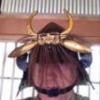-
Posts
14,148 -
Joined
-
Last visited
-
Days Won
265
Content Type
Profiles
Forums
Events
Store
Downloads
Gallery
Everything posted by Bugyotsuji
-
The Shimosaka smiths moved to northern Kyushu in preparation for the invasion of Korea by Hideyoshi. Would this Mei indicate the Yari as being pre 1590? Although one of these spears in full polish is potentially worth decent money, a polishing by a proper Japanese Togishi would be very expensive, even if you could find one willing to undertake such a difficult task as a Jumonji polish. And you would need to source an iron neck ring and appropriate saya sheath.
-
Had this one Alex, but there are two problems with it. 1. I may have sold it to a friend. 2. The Kaneie Mei is probably not legit. Someone told me Kaneie tsuba do not have fukurin. 3. The pine tree is on the reverse, with some flying Daruma figure on the front.
-
Check out: Kaseiin Kanjaku Nikko Shinji is the kaimyô or posthumous buddhist name of this actor. Mortuary poem: In the sky of the second month the sadness of the sparrow's flight remains https://jpsearch.go.jp/item/arc_nishikie-JA13029 https://www.bing.com/search?q=歌成院光信士&qs=n&form=QBRE&sp=-1&lq=0&pq=歌成院光信士&sc=0-6&sk=&cvid=D54E03FAACC24C8187EBE0448FBCD1C6&ajf=10
-
If I can find the photographs, here are two more examples of Tessen-guruma, clematis wheel kamon, one as an iron tsuba, and one in the sliver fittings of an amber netsuke.
-
Did you choose the frame, Jason? A page out of a book? Famous Kabuki actors? A winter (February) scene of a 55-yr-old travelling samurai wearing a cloak. In a shop? (Just guessing from circumstantial evidence!)
-
And a ‘nikuhitsu’ painting by the hand of (Isoda) Masakatsu, Hōbashi Koryūsai, active 1776-82. Kadomatsu with wrapped roots
-
My Kozuka shows nematsu or nebikimatsu with orizuru paper crane. (Shakudo gold and silver. Mei: Nagamine or Eiho. 永峯)
-
He can open a gentle 'window' in the blade to see what is under the rust there, and whether your blade contains potential for moving the process forward.
-
There is a polisher of Japanese swords in Scotland called Les, a good man. I'd advise showing it to him before any local restorer, if only for some sound advice and direction.
-
Check a list of Kinko artisans under Toshinaga, but if not, then try Toshihisa, Riju, etc., to find a reading that fits, as each one will have had a personal preferred reading.
-
Maybe the proposed Tsuka already had a deep and wide slot in it.
-
Conversely, it has been said that an excellent hadori will allow you to see all of the hataraki contained within it, a kind of ‘best of both worlds’.
-
Thank you, Moriyama San!
-
Loving the dark patina on this one. A trusty Ashigaru battlefield gun. Possibly Inatomi-Ryū school of gunnery, and possibly made in Kunitomo. Also I have a special attraction to the 鉄線 Tessen clematis Mon. Yours is Tessen-guruma or ‘clematis wheel’ design. Congratulations! Looking forward to your updates.
-
Thank you Uwe!!!
-
In my case, the Togishi told me he could reduce the blade to sashikomi, so I asked him to do just the one side. At the NBTHK local meeting we brought the blade for everyone to see, and among the members there was a more ‘senior’ Togishi whom he respectfully consulted for advice. When everyone finally recommended the sashikomi side (for Sue Bizen), then he was happy to go with that, especially to bring out the characteristic Sukesada Hamon.
-
The seller says alongside ‘Nakago’: 付け足し茎 Tsuke-ashi Nakago = added-leg tang (Nothing otherwise)
-
Hoping that anyone new to Netsuke here may get some idea of the variety there really was out there, throughout the Edo period and across all social strata.
-
大日本 Dai Nippon 吉田造 Yoshida zō/dzukuri 京都 Kyoto
-
笠原哲司 Kasahara Tetsuji (?) (Not sure of the Tetsu Kanji…)
-
This is the same blade but opposite sides. Hadori/Kesho to Sashikomi. PS Although Mumei, and papered to Sue Bizen Sukesada, many have suggested this is a blade by Yosozaemon Sukesada. From To
-
Took it to our local NBTHK meeting and elicited opinions. They took the blade in hand and compared sides. General agreement that Sue Bizen particularly can look better with traditional sashikomi. So that is what I went with, dumping the hadori.
-
No, I can see all of what you are saying, Rob, the brightness of the red, the unusual tiger, lack of foxing in the white etc., but the writing looks legit. Unless someone is copying from an original somewhere…(?) I was just curious as I have had several of these flags in the past, in varying materials and states, and I was wondering how everyone judges these, whether the fakes had any recognizable features in common? Good condition ones do sometimes come out of people’s boxes or drawers.
-
What makes you say that, h?











